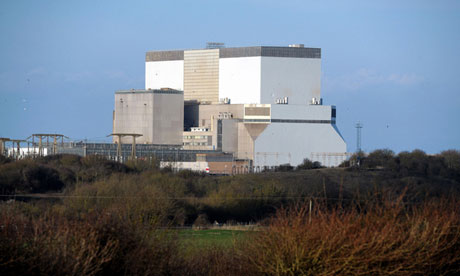Guilty nuclear protesters in defiant mood
Four people who blocked workers access to the Hinkley Point nuclear complex for nearly 4 hours in November pleaded guilty to obstruction of the highway at Taunton Magistrates Court today. The four were each given 12 months conditional discharge and ordered to pay £100 expenses.
Speaking after the verdict, tree surgeon Zoe Smith from Bristol was in a defiant mood. “Two days after we used lock-on tubes to form a human barrier at Hinkley Point the same tactic was used at EDF’s other planned development at Sizewell in Norfolk. This is a national campaign and I expect there will be many more surprises for EDF over the coming months. If the tories are prepared to pressurise our local representatives, change planning laws, and rubber-stamp EDF’s reactor design without a rigourous safety assessment, then we are prepared to put our bodies on the line to oppose them. The workers at the development site are clearing away our landscape before EDF even have planning permission”. On the day of the protest blockade Ms Smith had said that she was also there to register opposition to plans for extending the license of the ageing reactor at Hinkley B. The licence has since been granted by the Office of Nuclear Regulation, in spite of concerns over cracks in it’s graphite core.
Greeted by supporters outside the court, Barnaby Hodges (29) a catering worker from Glastonbury, said “I am proud of what we did. I have never been arrested for protesting before, but like many people in Glastonbury I am ready to take whatever non-violent action is necessary to prevent the building of a potential Fukushima only 25 miles away. It is a scandal that local people are being excluded from decisions which could lead literally to the evacuation of Somerset. It’s not as if there aren’t any alternatives.”
Bob Nicholls (55) who works with the homeless in Bristol said, “I don’t consider what we did was a crime. The real crime is that Hinkley C will be given the go ahead without any genuine consideration of the extreme danger that nuclear accidents and centuries-long radioactive waste storage will pose to the people of the south west. The entire planning process has been corrupted by the governments fixation with nuclear, at a time when we urgently need to switch to safe and renewable energy in the UK”.
